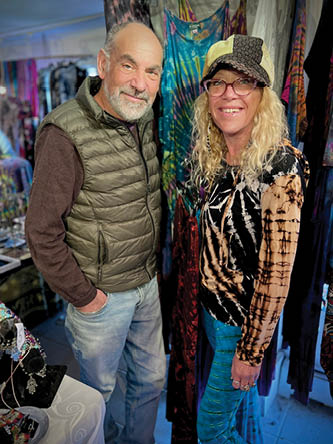
Ever since Woodstock-based Not Fade Away closed the doors of its New Paltz tie-dye outlet, the town’s preeminent “one-stop hippie shop” has been the Groovy Blueberry. Now the reign of this iconic downtown emporium is coming to an end as well. The week before Thanksgiving, a hand-drawn sign appeared on the door of the company headquarters at 1 Water Street announcing a final 50-percent-off storewide clearance sale. “See you on the flipside,” it read. “What a long strange trip it’s been.”
The sudden announcement took many longtime customers by surprise, and some have been making pilgrimages from as far away as Vermont, Maine and Maryland to make one last purchase, according to Amy Cohen, who has run Groovy Blueberry with her husband Jon Cohen in several locations since 1997. “I can’t believe how many people have been coming in. We’re getting 40-year-olds saying they wore our onesies when they were babies,” says Amy.
Besides taking over the tie-dyed clothing trade in New Paltz, Groovy Blueberry was the go-to store for counterculture paraphernalia of all sorts: incense and burners, essential oils like patchouli, black-light posters, jewelry from faraway lands, knickknacks, fun hair accessories and the like. It wasn’t a head shop, exactly; more a place where you went if you wanted to dress the part in a town with a long history as a hippie haven.
Casual clothing designed by Amy Cohen was the store’s mainstay, however, and for a long time Groovy Blueberry enjoyed a healthy sideline as a wholesale supplier to retailers nationwide as well, including some high-end department stores. Most of her clothing line was tie-dyed by hand, in styles and sizes for adults and children alike; all was designed for comfort. Her own output was supplemented in the shop by imported “ethnic” clothing, mostly from Asia: flowy cotton blouses and harem pants, often batiked or embroidered or appliquéd. In these threads, you could seriously get your groove on.
Both the Cohens had years of experience in fashion merchandising before they landed in New Paltz. At age 14, Jon spent his bar mitzvah money buying out the stock of gloves of a flea market vendor who wanted to retire, Amy recounts. After graduating from Brooklyn College, he opened a department store in Brooklyn selling designer clothing, but gave it up when his first wife became seriously ill, followed by an interval of running a newspaper on Long Island. His attachment to New Paltz was formed by an attempt at age 17 to hitchhike with a friend to Bear Mountain, which ended up in a detour to the famous nude swimming hole at Smitty’s in the Gunks.
“I grew up as a suburban brat in Scarsdale,” says Amy. “At 17 I went away to Cornell. I worked as a model and paid for my own education. I was also a child actress. I played Amy on the TV show The Magic Garden when I was 7 or 8.” At Cornell University she earned a degree in Painting and Art History, but by her own account, “mostly majored in following the Grateful Dead around. I didn’t go to my own graduation. My parents didn’t believe I’d actually graduated.”
Through a family connection, Amy then got a job as a junior buyer for Macy’s, but soon decided, “The corporate life wasn’t for me.” She managed a Putumayo outlet on the Upper West Side during a period in the early 1990s when there were “five to seven murders of retail managers within a radius of a few blocks. My mother gave me $5,000 and told me to quit my job.” She leveraged that seed money, her training in the arts and experience in clothing retail into becoming a designer of fabrics and trimmings. Soon she was traveling to trade shows all over the world, collecting ideas for new designs.
“That’s when I met Jon,” she says. “His best friend was my best friend’s boss.” It was the second marriage for both, and soon they were living on Long Island with Jon’s 12-year-old daughter and a new baby. Culturally, it wasn’t a good fit, however: “The neighborhood became very religious. The girls wouldn’t talk to me because I wore jeans.” They tried moving to Florida, but didn’t like it either. Finally Jon, who had spent much time visiting New Paltz since that fateful early exposure to the local skinny-dipping culture, talked her into moving upstate. “New Paltz was not my first pick, but I made it work for me,” Amy says.
In 1997 the couple opened the first incarnation of Groovy Blueberry in the storefront at 57 Main Street, next door to the Bistro, later renting a second store behind it on Church Street to house Groovy Two, selling children’s toys and games. They lived outside of town at first, then bought a house on North Chestnut Street. “We could walk to work,” says Amy. “It became a real mom-and-pop thing. I could check on the store while I was cooking.”
The Cohens had three sons together, though only Jon’s older daughter ended up deciding to go into the retail business (she now owns the hair accessories importer Threddies in Perkasie, Pennsylvania). One of Amy’s wildest anecdotes about running the Groovy Blueberry involves the birth of their second son. “I almost gave birth at 57 Main. It was on Christmas Eve in 1999. I broke my water in the store,” she relates. “In a lot of ways, the store has been like another child to us.”
In 2010 they opened a larger shop at 1 Water Street, which became the company’s headquarters and “a real hippie hangout,” in Amy’s words, where “We started making it fun for ourselves.” The new space had a great view of the Wallkill River and the Gunks, room for customers to relax, socialize and listen to music while they shopped and a privately owned 40-car parking lot across the street. That outdoor space, dubbed Blueberry Fields, is now home to “a sculpture garden that I started with some of my artist friends,” she notes, and was used for outdoor concerts during the COVID pandemic. They gave up the original store at 57 Main Street seven years ago.
Amy takes special pride in the many young people who came to work at Groovy Blueberry over the years, as well as the college interns she trained in clothing design. “We started this as a boutique and an outlet for our products, but it has become a vehicle for empowerment and learning,” she says. “There are some young women who worked here 20 years ago who at 40 years old are now more successful than I could ever be. I’d glad I could give them their legs and their bones to get started with their lives.”
Amy has also dedicated considerable time to volunteering over the years, first with the Police Commission and then the Town Planning Board, and even mounted a mayoral campaign in 2015. She was a booster for the replacement of the worn-out playground equipment in Hasbrouck Park and for the redesign of the bicycle path at Putt Corners, and credits Jon with coming up with the idea for the scenic overlook on the rebuilt Carmine Liberta Bridge. She intends to continue as a community activist after retirement: “I’ve been on the Village Planning Board since October,” she says. “I’m the liaison between the Village Planning Board and the Town Planning Board. But I’m no longer interested in running for office.”
Amy’s youthful interest in fine art is back on her radar; she has shows lined up locally, in Stockbridge, Massachusetts and in southern Florida, where the Cohens spend part of each winter. “Since the pandemic, I’ve made over 300 paintings,” she reports. Her husband, meanwhile, will pursue his lifelong interest in playing guitar under the stage name of Jon Van Cohen, attending lots of open mics. “We’ll travel around and see our friends perform who are in bands,” Amy adds.
And what of the future of 1 Water Street? The closeout sale will continue at least a little longer, and Amy encourages anyone interested in buying something to come in, as long as the Open sign is still up. The Cohens will continue to own the building. They have found a new tenant, whose identity they are not yet free to divulge. “We did not want to sell the business. We agreed that no one would be able to do it like us,” Amy says. “We’ve done everything that we wanted to do in and with our store.”
The sudden timing of the decision to close was determined by the Cohens’ finally finding an applicant whom they liked, who met their standards, culturally and aesthetically, while also passing rigorous financial background checks. “We were able to attract an A-plus tenant. It’s going to be bigger news than us closing,” Amy promises. “We’re really happy. The building is going to be put to really good use.”
This post was originally published on this site be sure to check out more of their content.








